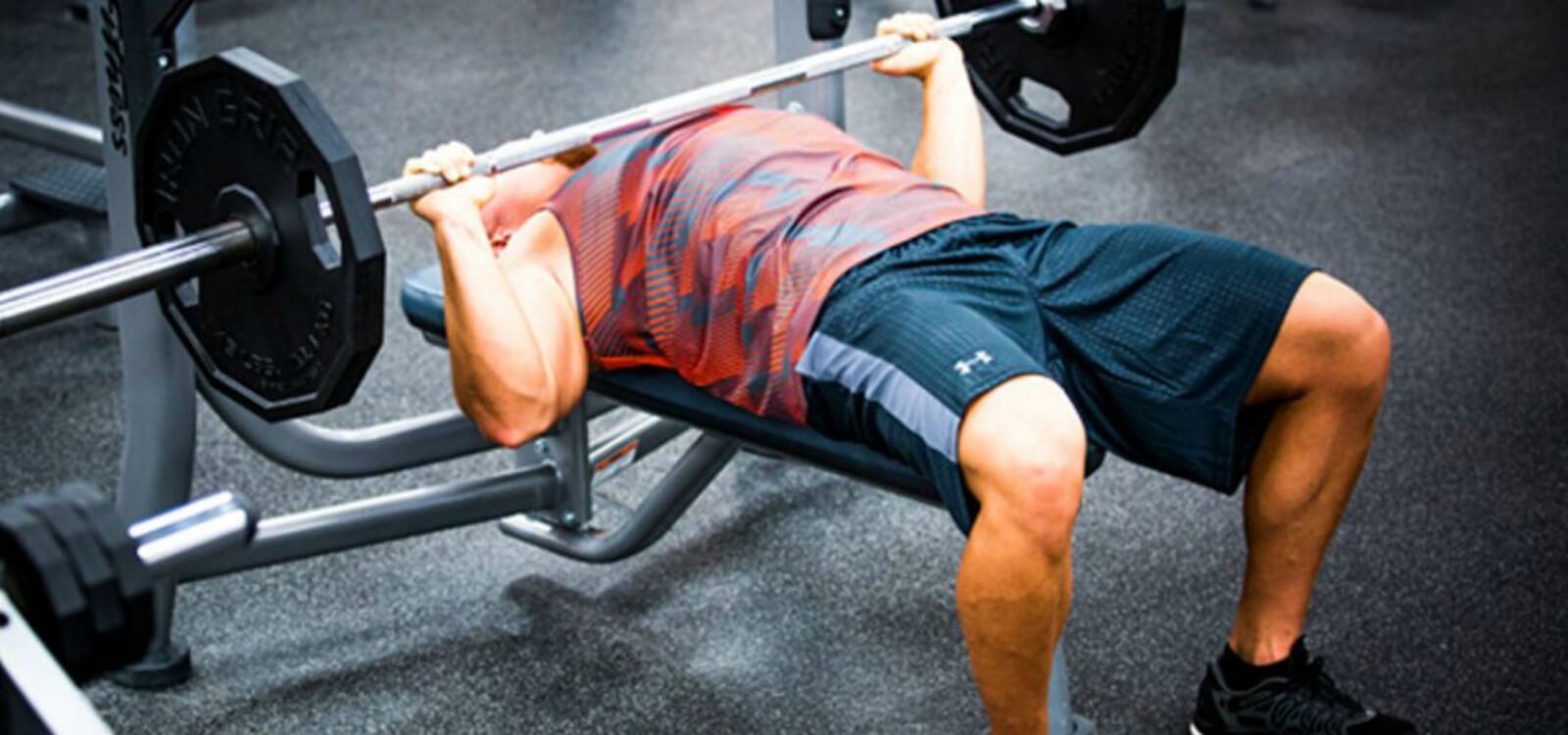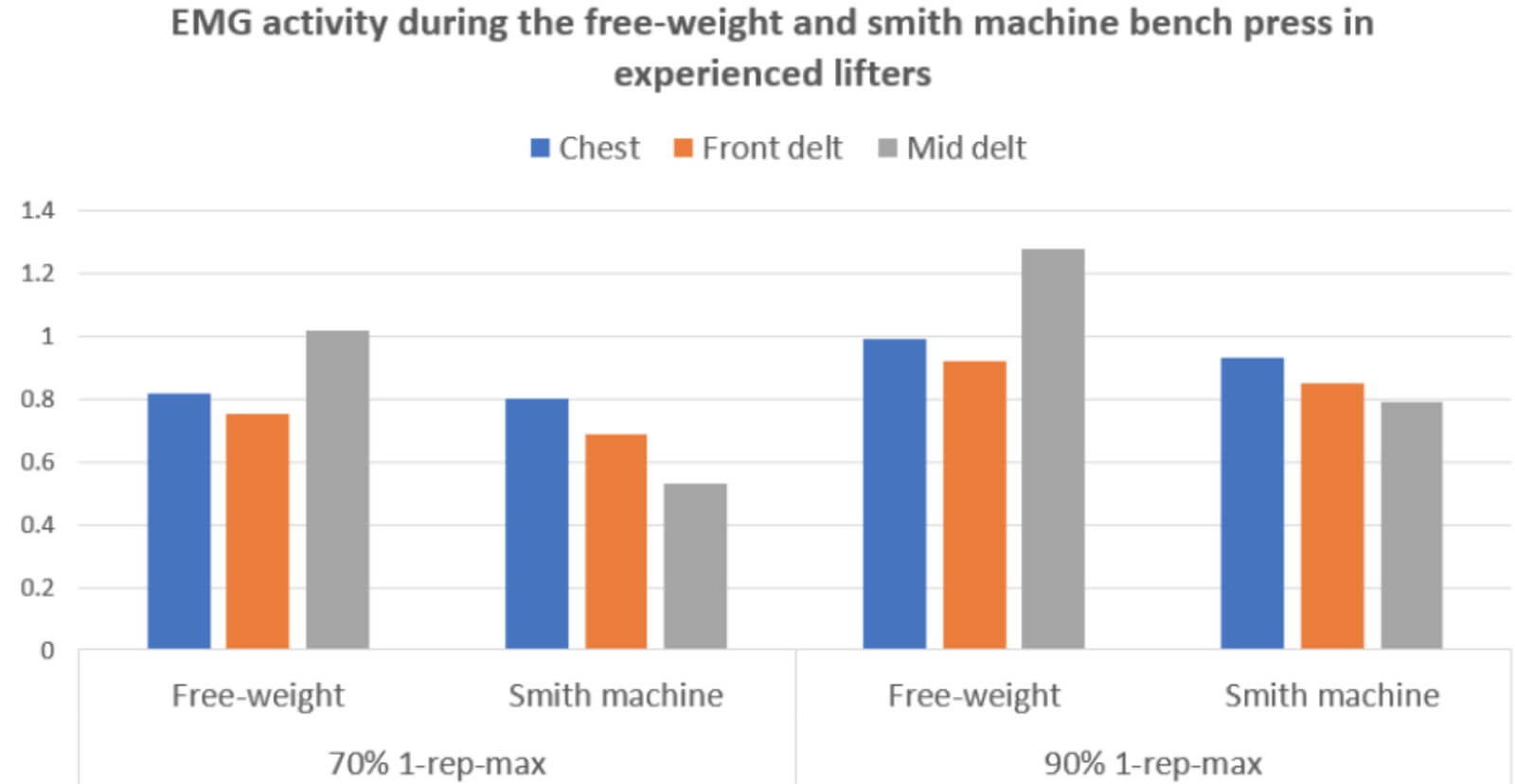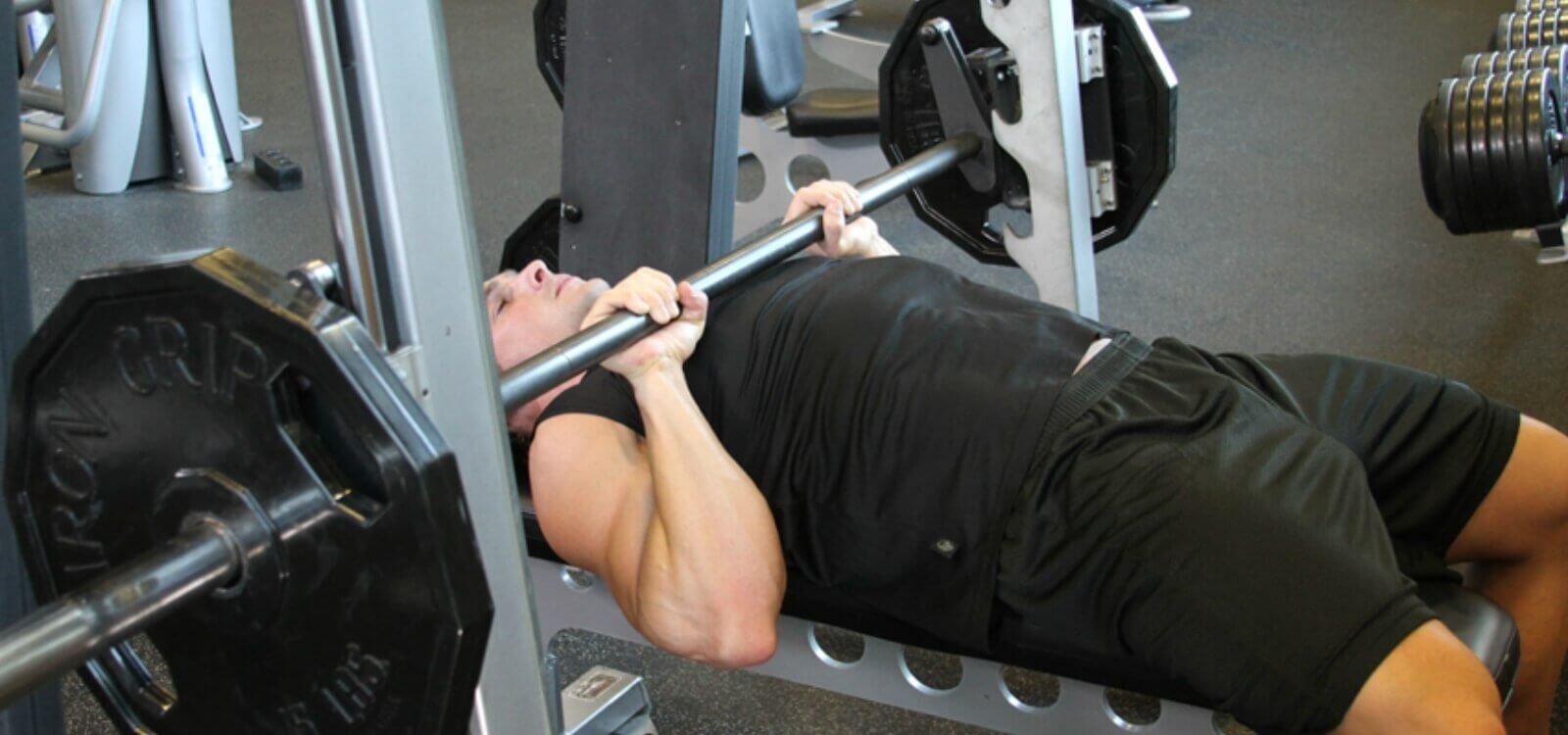[ad_1]
Fact Checked
Evidence Based
Key Takeaways
- Researchers wanted to see if bench pressing with a Smith machine or a barbell caused more muscle activation in the chest and shoulders.
- The barbell bench press produced just as much muscle activation in the chest and front part of the shoulder as the Smith machine bench press, and 50% more muscle activation in the middle part of the shoulder.
- If you want to get the best muscle-building bang for your weightlifting buck, then you want to prioritize the barbell bench press over the Smith machine bench press.
Which is better for building muscle: free weights or machines?
This debate has been going on in gyms for decades, and one of the most common examples is whether you should use the barbell bench press versus the Smith machine bench press.
Smith machine proponents claim that it’s easier to learn and it lets you use more weight (especially as a beginner).
So … what’s the catch?
The traditional counterargument is that it doesn’t train as many muscles as the barbell bench press, and thus isn’t as good for gaining strength and muscle.
Who’s right?
That’s what scientists from California State University wanted to find out in a study they published in 2010.
Let’s see what they found.
Recommended Reading:
→ Are Free Weights or Machines Better for Building Muscle?
→ The Best Way to Train All 6 Major Muscle Groups
→ The 12 Best Science-Based Strength Training Programs for Gaining Muscle and Strength
What Did the Researchers Do?

The researchers measured muscle activation in the chest and shoulders of 26 young men when they did both barbell bench press and Smith machine bench press with different weights.
On average, the subjects were about 20 years old and about half had at least 6 months of bench press experience and half were completely new to strength training.
Everyone was split into 2 groups:
- One group performed barbell bench press.
- One group performed Smith machine bench press.
Next, everyone performed a one-rep max (1RM) test to gauge their maximal strength.
The researchers placed probes on the pectoralis major (pecs), anterior deltoid, and medial deltoid (front and side shoulder muscles), and used electromyography (EMG) to measure how well each exercise activated the muscles.
EMG measures the electrical impulses from the brain to the muscles, and is the most reliable way to see how hard a muscle is working when lifting weights.
Then, everyone performed 2 reps with either 70% or 90% of their 1RM, which is more representative of the rep ranges most people use when training.
Finally, everyone returned to the lab on a separate occasion to perform the opposite exercise: the people who used the Smith machine used the barbell bench press and vice versa.
This reduced the chances that individual differences could skew the results.
Recommended Reading:
→ The Ultimate Chest Workout: Chest Exercises for Awesome Pecs
→ The Ultimate Shoulder Workout: The Best Shoulder Exercises for Big Delts
→ The Best Way to Train All 6 Major Muscle Groups


What Were the Study Results?
Muscle activation was the same in the pecs and anterior deltoids, but the barbell bench press increased medial deltoid activation by 50% more than the Smith machine bench press.
On the whole, this study backs up what experienced lifters have been saying for years:
The traditional barbell bench press is better than the Smith machine bench press when it comes to muscle activation, especially for targeting smaller muscle groups that help stabilize your body when moving heavy weights.
This is because when you do a barbell bench press (or any other free weight exercise), you have to work hard to keep the bar from deviating too far in one direction or another, and that requires many other small muscle groups to pitch in.
When you use a Smith machine, though, the machine guides the path of the bar and reduces the need for stabilizing muscles to work hard.
During the barbell bench press, for example, the medial deltoids had to work about 50% harder to stabilize the bar.
Remember too that the researchers only measured 3 muscles in this study. There are many other muscles that also indirectly work to help stabilize your body when bench pressing, including your lats, legs, and even your abs.
It’s quite possible that the barbell bench press also caused more muscle activation in these muscle groups.
This study also casts doubt on another argument for benching with a Smith machine, which is that because you don’t have to stabilize the bar, you can more effectively overload the other, primary muscles like the pecs.
That’s not what happened in this study.
The Smith machine didn’t cause any more muscle activation in the pecs or anterior delts, as you can see in this graph of muscle activation in the experienced lifters:

Finally, the last argument in favor of using a Smith machine is that it’s easier to learn, which means newbie lifters can start using heavier weights sooner.
In this case, though, new lifters got just as much muscle activation from the barbell bench press as people who’d been practicing for 6 months.
What Does This Mean for You?
Does this mean you’ll gain more muscle if you bench with a barbell instead of a Smith machine?
Not necessarily.
EMG measurements only tell us overall levels of muscle activation, and while it’s reasonable to assume that should lead to more muscle growth over time, we don’t know that for sure.
If you had to bet on which exercise was better for muscle growth, though, the smart money would be on the barbell bench press.
Anecdotally, many people find they plateau sooner when they start bench pressing with a Smith machine. They’re able to use heavier weights sooner (because it’s easier), but they also get stuck in more frequent and severe ruts.
That’s often when people roll up their sleeves and invest some time in learning how to barbell bench press, which pays greater dividends over time.
This doesn’t mean using machines is entirely without merit. They can be good for adding volume to stubborn muscle groups after you’re fatigued from your heavy compound lifting or for when you’re recovering from an injury.
Just don’t make the mistake of prioritizing machines them over your “big lifts” like the barbell squat, bench press, deadlift, and overhead press.
Recommended Reading:
→ 8 Proven Ways to Break Through Weightlifting Plateaus
→ The Best Way to Gain Muscle Without Getting Fat
→ The Definitive Guide on How to Build a Workout Routine
What’s your take on bench pressing with a Smith machine or a barbell? Have anything else to share? Let me know in the comments below!
+ Scientific References
- Vigotsky, A. D., Beardsley, C., Contreras, B., Steele, J., Ogborn, D., & Phillips, S. M. (2017). Greater electromyographic responses do not imply greater motor unit recruitment and “hypertrophic potential” cannot be inferred. Journal of Strength and Conditioning Research, 31(1). https://doi.org/10.1519/JSC.0000000000001249
- Raez, M. B. I., Hussain, M. S., & Mohd-Yasin, F. (2006). Techniques of EMG signal analysis: detection, processing, classification and applications. Biological Procedures Online, 8(1), 11. https://doi.org/10.1251/BPO115
You May Also Like
Our Most Popular Evidence-Based Articles
You don’t need supplements to build muscle, lose fat, and get healthy. But the right ones can help.
Take our 60-second quiz now to learn which supplements can help you achieve your fitness goals faster.
Sending…
Your free stuff is on the way!
Follow the Diet Plan that Helped Nikita Lose 15 Pounds in 3 Months
“I never thought getting in shape would be this simple! Everything just WORKS when you follow this plan.” And if he can do it, why not you?

Wait!
Want a Free Custom Meal Planning Tool?
Quickly calculate your calories, macros, and micros for losing fat, building muscle, and staying healthy.
Our “No Return Necessary”
Money-Back Guarantee
If you don’t like something of ours, guess what happens next?
No, we don’t request you deliver it to a PO box in the Gobi Desert by carrier pigeon. Nor do we ask you to fill a cursed inkwell with orc’s blood and demon saliva and then use it to complete reams of return forms written in ancient Cyrillic script.
We just . . . wait for it . . . give you your money back. Holy moo cows. And that means you can say “yes” now and decide later.
Free Worldwide Shipping & Returns
Many companies use shipping and handling fees to increase their profit margins, but here at Legion, we hate profits, so our shipping is free!
Okay, so we do dig on profits, but we also go in for happy customers, and free shipping works like gangbusters. So, if you live in the United States, your order ships free regardless of order size, if you live in the UK or Canada, your order ships free when it’s over $99, and if you live elsewhere, your order ships free when it’s over $199.
Also, if you don’t absolutely love our stuff for whatever reason, we don’t request you deliver it to a PO box in the Gobi Desert by carrier pigeon.
We just . . . wait for it . . . give you your money back. No returns. No forms. No nonsense. Holy moo cows.
That means you can say “yes” now and decide later. You really have nothing to lose.
Free Worldwide Shipping & Returns
Many companies use shipping and handling fees to increase their profit margins, but here at Legion, we hate profits, so our shipping is free!
Okay, so we do dig on profits, but we also go in for happy customers, and free shipping works like gangbusters. So, if you live in the UK or Canada, your order ships free when it’s over $99.
Why the restriction on international orders? Unfortunately, shipping abroad is very expensive, and if we didn’t require a minimum order size, we’d lose a lot of money. But! We’re also hustling to improve our international logistics and will be passing our savings along to our international customers.
Also, if you don’t absolutely love our stuff for whatever reason, we don’t request you deliver it to a PO box in the Gobi Desert by carrier pigeon.
We just . . . wait for it . . . give you your money back. No returns. No forms. No nonsense. Holy moo cows.
That means you can say “yes” now and decide later. You really have nothing to lose.
Free Worldwide Shipping & Returns
Many companies use shipping and handling fees to increase their profit margins, but here at Legion, we hate profits, so our shipping is free!
Okay, so we do dig on profits, but we also go in for happy customers, and free shipping works like gangbusters. So, if you’re outside the USA, your order ships free when it’s over $199.
Why the restriction on international orders? Unfortunately, shipping abroad is very expensive, and if we didn’t require a minimum order size, we’d lose a lot of money. But! We’re also hustling to improve our international logistics and will be passing our savings along to our international customers.
Also, if you don’t absolutely love our stuff for whatever reason, we don’t request you deliver it to a PO box in the Gobi Desert by carrier pigeon.
We just . . . wait for it . . . give you your money back. No returns. No forms. No nonsense. Holy moo cows.
That means you can say “yes” now and decide later. You really have nothing to lose.
Clinically Effective Ingredients & Doses
Many ingredients in supplements don’t have any scientifically validated benefits, and many ingredients that do are often underdosed to the point of irrelevance.
That’s why we only use the choice ingredients and precise doses shown to be effective in peer-reviewed scientific studies.
Clinically Effective Doses
You need more than great ingredients to make great products—you also need proper doses. That’s why we use the precise doses of ingredients shown to be effective in peer-reviewed scientific studies.
Natural Ingredients
“Natural” doesn’t always mean “better,” but in many cases, natural ingredients are superior to artificial ones for various reasons, including purity, safety, and efficacy.
That’s why all of our ingredients in all of our products come from plant and animal sources, including sweeteners, colors, and flavors.
Made in USA with Globally Sourced Ingredients
If you want to ensure the supplements you’re swallowing every day are safe and effective, you want products produced in the USA.
That’s why all of our supplements are made in America in NSF-certified and FDA-inspected facilities that operate in accordance with the Current Good Manufacturing Practice (cGMP) regulations.
Lab Tested
Did you know that supplements can contain dangerously high levels of toxins like lead, arsenic, and cadmium?
That’s why we test every ingredient of every supplement we produce for heavy metals, microbes, allergens, and other contaminants and ensure they meet the strict purity standards set by the FDA.
Naturally Sweetened & Flavored
While artificial sweeteners may not be as dangerous as some people claim, studies suggest that regular consumption of these chemicals may indeed be harmful to our health.
That’s why all of our supplements are naturally sweetened and flavored and contain no artificial food dyes, fillers, or other unnecessary junk.
Science-Backed Ingredients
Many ingredients in supplements don’t have any scientifically validated benefits. That’s why we only use choice ingredients shown to be effective in peer-reviewed scientific studies.
No Chemical Junk
“Natural” doesn’t always mean “better,” but in many cases, natural ingredients are superior to artificial ones for various reasons, including purity, safety, and efficacy.
That’s why all of our ingredients in all of our products come from plant and animal sources, including sweeteners, colors, and flavors.


Split your entire online purchase into 4 interest-free payments, over 6 weeks with no impact to your credit.

25%
today
25%
2 weeks
25%
4 weeks
25%
6 weeks

Shop and add items to your cart as normal!

Choose Sezzle at Checkout! You’ll be redirected to Sezzle to Sign Up or Log In
to complete your order.

Your order will be shipped out right away* and your payments will be split up
over 6 weeks.
*shipping times subject to merchant shipping policy
Shop directory. Reschedule payments. Plus more!
Waiver and Release of Liability
In consideration of the services and/or products offered by Legion Athletics, Inc. (“Legion”) including, but not limited to, nutrition plans, exercise routines and coaching, and in addition to the payment of any fee or charge:
I knowingly and voluntarily enter into this waiver and release of liability and hereby waive any and all rights, claims or causes of action of any kind whatsoever arising out of my use of Legion’s services and/or products, and I hereby release and hold harmless Legion and its consultants, officers, contractors, agents, owners and employees from any and all responsibility, liability, cost and expenses, including for injuries, damages or disorders (physical, metabolic, or otherwise), resulting from my use of Legion’s services and/or products.
I understand that fitness activities including, but not limited to, strength, flexibility, and cardiovascular exercise, with or without the use of equipment, are potentially hazardous activities that involve a risk of injury and even death, and I am voluntarily participating in these activities and using equipment and machinery with knowledge of the risks involved. I hereby agree to assume and accept any and all risks of injury or death related to said fitness activities.
I understand Legion’s services and products are not meant to treat or manage any health conditions or circumstances, and I acknowledge that Legion has recommended I obtain a healthcare provider’s approval for my use of Legion’s services and/or products, through regular physical examination(s) and/or consultation. I acknowledge that I have obtained my healthcare provider’s approval or have decided to use Legion’s services and/or products without such approval and hereby assume all responsibility for my use of said services and/or products.
I understand that results from using Legion’s products and/or services are not guaranteed, and I agree to not hold Legion liable for any outcomes or lack thereof.
OUT OF STOCK
Security Check
Please click the checkbox below. We apologize for the inconvenience.
If you don’t absolutely love this product, just let us know, and we’ll give you a full refund on the spot. No forms or return necessary.
Analyzed for purity and potency in a state-of-the-art ISO 17025 accredited lab by Labdoor™, the gold standard of third-party lab testing.
Analyzed for purity and potency in a state-of-the-art ISO 17025 accredited lab, the gold standard of third-party lab testing.
This product doesn’t just “contain natural ingredients”—every ingredient is naturally sourced from plants and animals. This product contains no artificial or synthetic sweeteners or flavors of any kind.
Fact Checked
Our scientific review board of nutritionists, dietitians, molecular biologists, doctors, and other accredited experts is responsible for reviewing every article, podcast, and video we produce to ensure they’re evidence based, accurate, trustworthy, and current.
Thanks to their connections, credentials, and academic experience, this team of MDs, PhDs, and other professionals has access to a wealth of research published in the largest and most prestigious journals in the world.
This allows them to not only review individual studies but also analyze the overall weight of the evidence on any and all topics related to diet, exercise, supplementation, and more.
If you feel that any of our content is inaccurate, misleading, out-of-date, or anything less than factual, please let us know in the comments section of the article in question.
Evidence Based
We follow a detailed, rigorous, multi-step process to create content that meets the highest standards of clarity, practicality, and scientific integrity.
First, our research associates provide our editorial team with accurate, up-to-date, proven scientific evidence.
Then, our editorial team uses this research to draft articles and outlines for podcasts and videos.
Finally, our scientific review board reviews the content to ensure all key information and claims are backed by high-quality scientific research and explained simply and precisely.
If you feel that any of our content is inaccurate, misleading, out-of-date, or anything less than factual, please let us know in the comments section of the article in question.
[ad_2]
Source link



